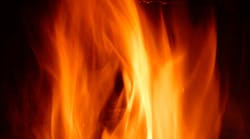Combustible dust, accumulated particulate solids with the potential to ignite and create a flash fire hazard, is a present danger for a number of industries. However, workers can reduce burn injury with the use of flame-resistant (FR) clothing.
Personal protective equipment manufacturers are the “go-to” experts in the use of PPE: Their representatives serve on ANSI, NFPA and ASTM committees and much of the research and development and testing of PPE is done by manufacturers.
According to Workrite Uniform Co., employers need to ensure that FR clothing is UL-certified to NFPA 2112, the “Standard on Flame-Resistant Garments for Protection of Industrial Personnel Against Flash Fire.”
Workrite created a “Top 5” list of industries that face the highest risk of combustible dust explosions to generate awareness among employers and workers.
Food Production - Many agricultural products – such as sugar, grains, egg whites and even powdered milk – carry a risk of combustion under the right conditions. Workers in the agricultural industry should be aware of the inherent risk of handling, transporting and storing these products.
Synthetic Manufacturing – Materials that are common in synthetic manufacturing – including rubber, plastics and other man-made substances – can create combustible dust clouds with the potential to ignite.
Woodworking – Frequently cutting, grinding, sanding and polishing wood can generate a significant amount of sawdust, which is able to easily combust in certain conditions such as being ignited by a spark from a nearby machine.
Metal Processing – Dust from metals like aluminum, chromium, iron, magnesium and zinc is combustible, and many of the activities in a metal processing environment can produce heat and sparks.
Recycling Facilities – Recycling facilities handle a wide variety of materials, and the sorting, processing, handling and transporting of these materials increases the risk of explosions caused by combustible dust.
To help combat the heightened risk of combustible dust explosions, it is important for workplaces to perform risk assessments, keep work areas clean, conduct regular inspections and ensure that employees wear the appropriate personal protective equipment (PPE).
For detailed information, review NFPA 654, which is the industry standard that provides the safety measures to prevent and mitigate fires and dust explosions in facilities that handle combustible particulate solids. For more information on combustible dust and other safety hazards, industry standards and the role of FR clothing in workplace safety, visit www.frinformation.com.

